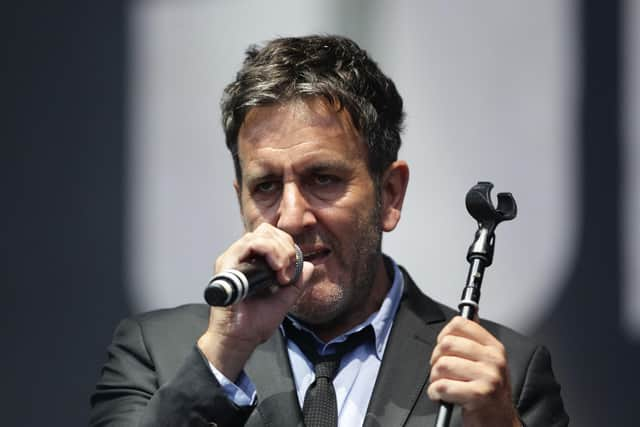Terry Hall: The Specials lead singer dies aged 63
London-based ska legends Madness led tributes to Hall on Tuesday, alongside Ian Brown, The Proclaimers and Shane MacGowan.
Hall’s death at the age of 63 was announced on The Specials’ official Twitter page on Monday.
Advertisement
Hide AdAdvertisement
Hide AdThe musician rose to fame as part of The Specials in the late 1970s, with number one hits including A Message To You, Rudy, Rat Race and Ghost Town, and the band was known for their ska and rocksteady style.


Following the band’s split in 1981, Hall embarked on a number of successful solo and collaborative projects, working with the likes of Lily Allen and Damon Albarn.
Madness, who also helped pioneer the ska genre during the late 1970s and early ‘80s, shared a black-and-white picture of Hall on Twitter from their official account.
“A terrible loss to all of us, way too young, RIP Terry Hall,” the account tweeted.
Brown, who fronted The Stone Roses before striking out on a successful solo career, described Hall as “an inspiration and a lovely fella”.
“R.I.P TERRY HALL. A musical pioneer, a true original, one of the great frontmen, an inspiration and a lovely fella,” he wrote.
Pogues frontman MacGowan wrote: “Really f****** sad to hear about Terry Hall, he was a great guy and I am praying for his family and friends @thespecials.”
Advertisement
Hide AdAdvertisement
Hide AdScottish rock duo The Proclaimers said in an online tribute that Hall was “a quite brilliant, singer, songwriter and lyricist with profound humanity”.
The Specials were formed in Hall’s home city of Coventry in 1977, becoming the multiracial flagship of the 2 Tone movement, with songs on racism, unemployment and injustice demonstrating a very clear political stance.
They went on provide a musical backdrop to economic recession, urban decay and societal fracture in the early 1980s.
The band originally consisted of Jerry Dammers, Lynval Golding and Horace Panter, with Hall, Neville Staple, Roddy Byers and John Bradbury joining a year later.
The group were called The Automatics before changing their name to The Coventry Automatics, The Specials AKA The Automatics and finally, in 1978, settling on The Specials.
The band split in 1981 after which Hall, Golding and Staple went on to form Fun Boy Three, while Dammers and Bradbury released an album under the moniker The Special AKA, which spawned the hit single Free Nelson Mandela in 1984.
Fun Boy Three achieved four UK top 10 singles during their time together, until Hall left the band in 1983 to form The Colourfield with ex-Swinging Cats members Toby Lyons and Karl Shale.
Advertisement
Hide AdAdvertisement
Hide AdIn his own tribute, Staple said the news of Hall’s death had “hit me hard”.
“We knew Terry had been unwell, but didn’t realise how serious until recently,” he said. “We had only just confirmed some 2023 joint music agreements together.”
The Specials embarked on a 2009 tour to celebrate their 30th anniversary and in 2018 supported The Rolling Stones during a concert at Coventry’s Ricoh Arena.
In February 2019, The Specials released Encore, their first album of new material in 37 years.
Upon release, the album went straight to number one on the Official UK Album Chart, marking their first number one album, and the first time they had topped the charts since their classic track Ghost Town in 1981 and since their single Too Much Too Young became a number one in 1980.
The album’s lead single, the politically-themed Vote For Me, was considered by some fans as a follow-on from Ghost Town, which was hailed as a piece of popular social commentary having been released during the riots across England in 1981.
Hall told The Big Issue magazine in 2019: “I find myself in awe of the mess, nightly listening to politicians giving their opinion and thinking, I don’t necessarily trust any of you, really.
“It is pretty sad. I grew up aligned to a party, the Labour Party, quite strongly. Until Tony Blair made Noel Gallagher prime minister I knew exactly where I stood.”
Comments
Want to join the conversation? Please or to comment on this article.